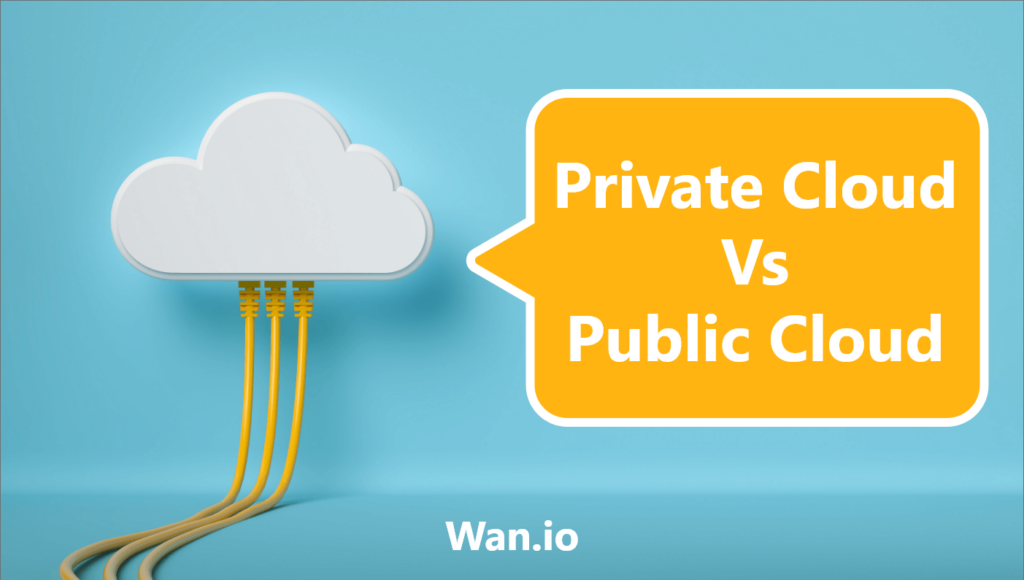Private Cloud Vs. Public Cloud : Pros and Cons

Cloud computing was not that popular initially, but things have changed significantly. In the current era of advanced technologies, the cloud has become popular and is considered a new norm for business applications and services. One of the most significant issues is that people need clarification about choosing between private cloud and public cloud. The most common question is which is better than the other.
Like the technologies of most other things, it could be more straightforward to understand. There are situations that justify the money, effort, and time for maintaining a public cloud. On the other hand, there are cases where you may see that a public cloud is a better option.
In order to choose the right option, you must determine your organization’s needs. You also need to understand the difference between public and private clouds. Here we will describe a comparison between the private and public clouds so that you can make a better decision.
But first, let’s understand cloud computing.
What Is Cloud Computing?
Cloud computing is accessing or storing programs, data and apps through the internet instead of storing directly on your computer’s hard drive. The most famous examples of cloud computing include Platform as a Service (PaaS), Software as a Service (SaaS), and Infrastructure as a Service (IaaS). Most of which you can choose to set up in public or private according to your needs.
The increasing popularity of cloud computing is giving rise to more as-a-service offerings such as:
- DaaS: Desktop as a Service
- AIaaS: AI as a service
- RaaS: Ransomware as a Service
- ITaaS: IT as a Service
A cloud service consists of client-side systems that are connected to backend data center components. The components of cloud infrastructure are as follows:
- Network
- Hardware
- Storage
- Visualization
The underlying infrastructure architecture can be in different forms, such as virtualized, hyper-converged, or software-defined. Cloud computing provides several benefits to both individuals and companies, including reduced complexity, optimizing DevOps, and planning for the future.
What Is A Private Cloud?
A private cloud, also known as an on-premises private data center, has a dedicated hardware infrastructure. It can be deployed as an onsite data center of a company, or it can be a third-party service provider.
Here the service provider will be responsible for taking care of the underlying infrastructure. However, the server is always maintained on a private network and solely dedicated to your organization.
In this way, a private cloud helps an organization to customize its resources and meet specific IT needs. This type of cloud is best suited for large organizations and highly regulated businesses such as financial institutions, healthcare, government agencies, and business-critical operations looking for enhanced control over their environment.
Pros of Private Cloud
When comparing services, structure, and options of a private cloud from different vendors, always keep the benefits of a private cloud in mind.
Here are some most significant benefits of the private cloud:
-
More Flexibility
Flexibility is one of the primary benefits of the private cloud, and it is the first reason that companies look for when migrating to the cloud.
You can customize your cloud environment to meet specific business requirements.
On a private platform, there are no compatibility issues and limitations on applications. In essence, a private cloud can be altered to be whatever you want it to be.
-
Increased Security
Since a private cloud does not share your resources with any other organization or user, this network provides you with greater control, security, and privacy.
It is often the most common reason companies switch from a public to a private cloud.
You will have more control over the security software in use and also great control over access to their data.
-
Easy Scalability
Private clouds offer enhanced scalability compared to conventional on-premises infrastructures.
Just like a public cloud, a private cloud allows IT teams to scale up their storage based on their tenants’ needs.
In addition, it enables businesses to execute mission-critical applications which need a dedicated server to act as a virtual server.
-
Better Performance
When you compare the private cloud vs. the public cloud, you will see that a private cloud is more reliable for high SLA performance.
Also, if it is not shared with other users, you will benefit from efficient performance.
-
Guaranteed Compatibility
Public clouds can limit the number and type of data, programs, and options that you deploy in your public cloud. Typically, private clouds come with more customizable and come with more options than public clouds.
It means you can do whatever you want on a private cloud to ensure that it meets your organization’s data storage needs.
Cons of Private Cloud
Here are some drawbacks of private cloud that you must be aware of:
-
High Cost
A private cloud model is always more expensive than a public cloud. It has a high total cost of ownership because the organization either has to build its own network or pay a third party to do it on its behalf. This cost can be even more in short-term use cases.
A complete onsite cloud system needs more cost to invest in data centers, servers, software licenses, and network infrastructure.
However, hosted private clouds are less costly due to the reduced need for onsite IT staff to deploy and manage your cloud.
-
Limited Access
Due to several security layers, mobile or remote users have limited access to private cloud environments.
Given recent workforce trends and the effects of the pandemic, private cloud environments do not support the needs of the modern workforce.
-
Maintenance
In all types of hosted and managed private cloud systems, you will see yourself paying a high maintenance cost for the infrastructure and other services.
For example, a hosted private cloud environment needs capital investments in data centers and networking equipment.
Again, you can avoid it with a managed or virtual private cloud system that lowers the cost of deploying and maintaining the cloud.
-
Numerous Options
Not all companies require unlimited storage for high volumes of data. Some companies feel overwhelmed by the large number of options available when building a private cloud.
These companies may only need one or two types of Software instead of having an array of various Software, service options, and applications.
-
Inability To Keep Up with Unpredictable Demands
Private cloud infrastructure is unable to handle unpredictable demands, especially if the cloud data center is restricted to on-premise computing resources.
What Is A Public Cloud?
Public clouds are the most common type of cloud computing, which is defined as an IT service in which a provider makes resources available to the general public through the internet. The resources of such a cloud, including hardware, Software, and supporting infrastructure, are owned and operated by a third-party cloud service provider. All the users can share devices, storage, and hardware without paying any upfront cost.
In some cases, cloud service providers employ subscription-based facilities, and users have to pay depending on their specific cloud usage. You can access services and manage your account through web browsers. Public clouds can be suitable for startups that need efficiency and scalability. However, companies targeting performance, flexibility, and scalability can work with public cloud providers and have a tangible return on investment for it. It will be the same as plug-and-play technology.
Public cloud deployments are generally used to provide online office applications, web-based email, storage, testing, and development environments.
Unlike a local data center, a private cloud does not need robust financial footprints. Network information is hosted on an external server.
The defining features of the public cloud include the following:
- High elasticity and scalability
- A low-cost subscription-based tier
Pros Of A Public Cloud
A public cloud is beneficial for startups and companies who want to avoid investing in physical space or equipment.
The hiring of this service is done on demand, which means you can also gain scalability to grow. If your business grows, there is a traffic spike, or your data center reaches the operating limit, you can switch to a comprehensive plan.
Let’s have a detailed look at the benefits of the public cloud.
-
High Scalability
A public cloud solution enables your organization to evolve almost infinitely. It can not be possible with a local data center. You can easily scale up or down your storage when needed with such a solution.
Because the cloud service provider dynamically divides the resources between customers, your organization can double or triple the storage to meet the peak demands.
This scalability promotes the faster deployment of organizational products and services. You can get all these benefits without increasing your workload or the cost of the system.
-
Cost Effective
In the public cloud model, you will have a lower IT cost because there is no need to purchase, operate or maintain any hardware or Software. The cost of hardware, applications, and bandwidth are the service provider’s responsibility.
The payment of the service can be monthly or annually. You will need to pay only for the resources you use because it follows the model pay-as-you-go.
-
Limited Maintenance
Another benefit of public cloud infrastructure is that your cloud provider will be responsible for all the maintenance servers and associated assets.
It will also reduce the burden on in-house IT professionals, and they can commit themselves to other responsibilities that need attention.
-
Reliability
A public cloud is more reliable and flexible as compared to a private cloud. It is easily adapted to peak loads, and clients can add or delete resources according to their needs.
The workloads of the public cloud can be quickly moved from one server to another in case of failure or performance issues. That is why it is highly reliable, and you can get the issue solved quickly.
In addition, it also reduces the complexity and implementation time to test and deploy new applications.
-
Business Focus
As we described above, the cloud vendor is responsible for all hardware and server maintenance.
It reduces the complexity and requirement of your in-house IT team, and they can focus on more important aspects to improve your organization’s performance.
Cons Of A Public Cloud
Along with a number of benefits, there are some drawbacks of the public cloud that you should keep in mind before making a decision.
-
Security
The protection and privacy of data hosted by cloud service providers are the major concerns of any business. The public cloud infrastructure follows the shared responsibility model.
It means that the third-party service provider monitors and responds to threats to the cloud system, but they are not responsible for the security of each customer’s data, workload, operating systems, or application. Thus companies need to adopt good practices for cybersecurity.
Furthermore, it is a shared infrastructure, so the companies are also subjected to the security risks created by other tenants.
-
Less Technical Control
The public cloud offers companies limited technical control over the infrastructure, which ultimately leads to low visibility.
It is also a reason for several serious issues when compliance requirements come into the picture.
-
Dynamic Cost
Although public clouds are less expensive than private clouds, the ownership cost increases sharply when it is scaled for extensive usage.
Medium to large enterprises is more susceptible to this rise in cost because their operation can increase rapidly according to the demand.
-
Lack of Support
In a public cloud model, support is a separate contract, and some providers may deliver a quality of service that is different from an enterprise system’s expectations.
For example, if you rely on a free cloud, you will need to discover many solutions on your own.
When you are using virtual machines, this type of hosting is not suitable for all environments. It is because some machines do not support virtual machines and need a dedicated server; others are very resource intensive.
-
Migration
For many companies, shifting to a public cloud is complex and time-consuming, and it also needs significant resources. In addition, most public cloud services offer a pay-what-you-use billing option.
Companies must be sensible about what data, services, and applications they want to host in the cloud.
How to Choose The Right Cloud Solution?
Whether a private or a public cloud will be the right solution for you all depends on the requirements of your business.
Here are some key points you should remember when choosing a cloud solution.
- Always look at the operating cost of each model.
- Determine the traffic demand of your network.
- How often do you need a system to be updated?
- The quality of internet connection in the surrounding.
Conclusion
Both public and private clouds have played an important role in bringing cloud technologies to the front. Now, most businesses rely on cloud services to store their data online and use cloud-based applications. Both cloud infrastructures have their own benefits and drawbacks. While a public cloud offers ease of setup, accessibility, and affordability, a private cloud emphasizes customization, privacy, control, and isolation. You must look at the pros and cons we have described above and consider your IT strategy to make a better decision.



